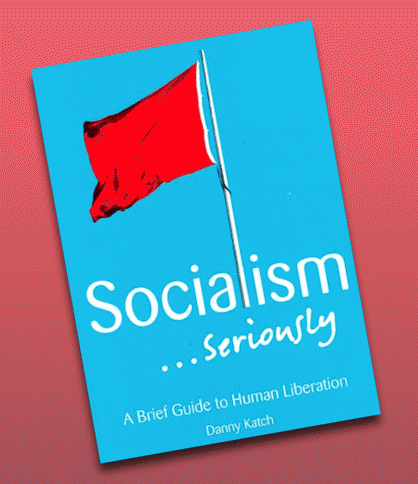Copyright truth-out.org. Reprinted with permission.
(Image of book cover added.)
Is there an alternative to capitalism's great injustices? Activist and journalist Danny Katch has written an introduction to socialism that manages to be not just accessible, but hilariously funny. Socialism ... Seriously is essential reading for the budding socialist in your life, and maybe even a few skeptics. Make a donation to Truthout to order your copy today!
The following is an interview with Danny Katch, author of Socialism ... Seriously: A Brief Guide to Human Liberation.
Mark Karlin: You have entitled your new book: Socialism ... Seriously: A Brief Guide to Human Liberation. How do you feel socialism, in its purest form, facilitates human liberation?

Socialism ... Seriously: A Brief Guide to Human Liberation.
(Image by Socialism ... Seriously: A Brief Guide to Human Liberation.) Details DMCA
Danny Katch: I meant the subtitle to be both humorous and earnest - like the rest of the book. Presenting a "brief guide to human liberation" is ... ambitious, to put it mildly. But it's important to bring back words like "liberation" that have faded from our vocabulary. As our energies have shifted almost entirely to defensive struggles to preserve our rights and standard of living, our expectations about the possibility of a fundamentally better world have been relentlessly lowered.
Danny Katch. (Photo: Liza Herschel)The incredible potential of human beings has always been limited by the need for most of us to spend all of our waking hours struggling to survive - either because of our limited tools and technology, or in more recent times because of social structures that concentrate wealth and power among small minorities of people. By redistributing that wealth and power to be democratically controlled by all of us, socialism could both liberate billions of individuals currently chained by poverty and exhaustion, and liberate our entire species from the need to restrict our cultural and ecological aspirations to whatever can make a profit for a tiny handful of jerks.Let's go to a timely question bearing upon the presidential primaries that is the subject of much progressive analysis. Briefly, how does Bernie Sanders' concept of democratic socialism differ from your vision of socialism?
Bernie's socialism is based on the model of Scandinavian social welfare states. I'm thrilled that Sanders is using the platform of the presidential election to educate millions of Americans about their universal health care and paid family leave policies - those are exactly some of the higher expectations that we need! Unfortunately, Sanders is running inside the Democratic Party, which is not a Scandinavian social democratic party but in fact is one of the pillars of our two-party oligarchy. The party hopes to use Sanders' exciting campaign to pull his left-wing supporters into eventually supporting the far-less exciting campaign of Hillary Clinton.
Beyond that, the difference between "Scandinavian socialism" and the Marxist vision that I put forward isn't that the former is more "democratic" but actually that it is less so. Power and wealth is still concentrated among Scandinavian elites - they have just been forced to hoard less of it than their counterparts here in the US. On the international level, meanwhile, their support for US wars in the Middle East and the growing hostility to the refugees (among some Scandinavian nations) that those wars have created demonstrate that they don't offer any type of significant alternative - which unfortunately is also true of Bernie Sanders when it comes to foreign policy. The revolution, in short, won't be funded by IKEA.
Chapter 7 of your book is entitled, "Worker's Power." You state in that section: "The workers would do a much better job, not the class as it exists right now but the one that can come into being through future struggles." Let me offer just three of a multitude of examples of current loosely categorized demographic groups of workers in the US: unions, workers with a high school education or below, and the primarily young people who have conducted actions to raise the minimum wage to $15. To draw some broad generalizations, many members of the declining union base are very loyal to the capitalist system, many of the individuals with a high school education or below are perceived to be supporters of the capitalist demagogue Donald Trump, and the movement toward a $15 minimum wage is an implicit acknowledgement of the capitalist system, with an incremental tweak, not a rejection of it. In short, in the US, where would you see a transformation of workers into the kind of socialist force that has propelled radical transformation in other nations?
The transformation can come among workers in all the categories you mention, as well as others: undocumented immigrants, young people bouncing back and forth between college and low-wage work and tech workers who think they're upper-middle class until the next bubble bursts. All types of workers are more likely to support the status quo or reactionary ideas when we are being cowed by our bosses and divided against each other. It's when they start figuring out how to come together and resist that many of them become more politically open to radical politics.
There is currently a historically low level of strikes in the US - which is one reason an anti-union billionaire like Donald Trump is getting a hearing among some workers. At some point that is going to change, but it's difficult to say where or when. Not many of us could have predicted a few years ago, for example, that two of the most militant sections of the working class would be fast-food workers fighting for $15 an hour and public school teachers rebelling against corporate education "reform" schemes. These days when conservatives rail about striking "union thugs" they're often talking about you're old second grade teacher.
(Note: You can view every article as one long page if you sign up as an Advocate Member, or higher).






